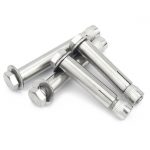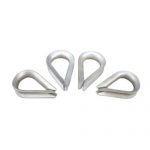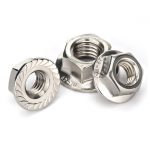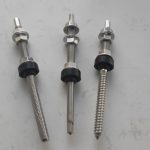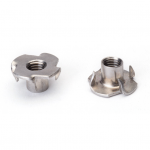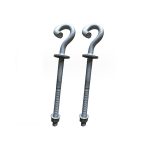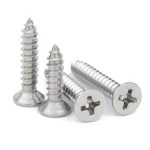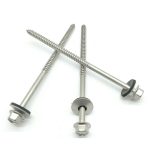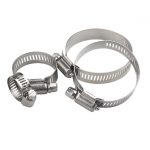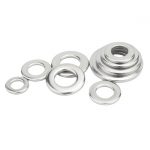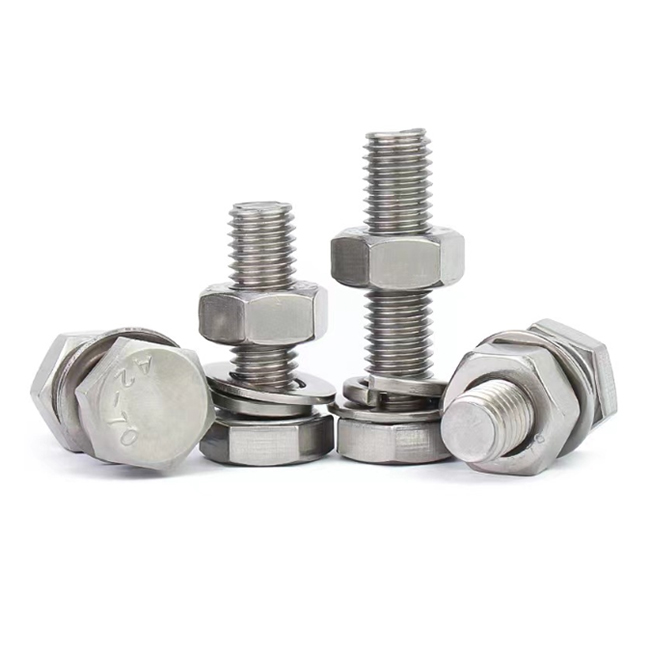
Product Description:
Standard: DIN933 /DIN931/ ISO4014/ISO4017/ASME B18.2.1
GRADE: A2-70,A4-80
Material: stainless steel A2-304,A4-316,SMO254,201,202,
Size:from #8 to 2”, from M3 to M64.
Length:from 1/2" to 12" ,from10MM-300MM
Surface finish:Plain or Customized
Packing: cartons with furmigated pallets
Supply ability: 50tons per month
Assembly: normally with nut or hex flange nut
When it comes to securing two or more objects together, bolts are an indispensable component. Among the different types of bolts, hex head bolts are one of the most popular options. In this article, we will delve into everything you need to know about SS hex head bolts, including what they are, how they work, their benefits, and applications.
What are SS Hex Head Bolts?
A hex head bolt, also known as a hexagon head bolt, is a type of fastener with a six-sided head. The head is typically larger than the shaft, making it easy to grip and turn. SS hex head bolts are hex head bolts made of stainless steel, a highly corrosion-resistant material that is ideal for outdoor and harsh environments.
How do SS Hex Head Bolts Work?
SS hex head bolts work by passing through holes in the objects being joined, with a nut tightened onto the end of the bolt. The head of the bolt provides a surface for a wrench or socket to turn the bolt while the nut applies the clamping force to secure the objects in place. Hex head bolts are often used in conjunction with washers to distribute the clamping force evenly over a wider area.
Benefits of SS Hex Head Bolts
There are several benefits of using SS hex head bolts, including:
- Corrosion resistance: SS hex head bolts are made of stainless steel, which is highly resistant to rust and corrosion, making them ideal for outdoor and harsh environments.
- Strength: SS hex head bolts are strong and durable, able to withstand heavy loads and stress without breaking or deforming.
- Aesthetic appeal: SS hex head bolts have a sleek and modern appearance, adding an aesthetic appeal to the overall look of the object being secured.
- Ease of installation: SS hex head bolts are easy to install and remove, requiring only a wrench or socket to turn the bolt.
Applications of SS Hex Head Bolts
SS hex head bolts are used in a wide range of applications, including:
- Construction: SS hex head bolts are commonly used in construction to join steel beams and other structural elements.
- Automotive: SS hex head bolts are used in automotive applications, including engine assembly and suspension components.
- Marine: SS hex head bolts are ideal for marine applications due to their corrosion resistance and ability to withstand harsh saltwater environments.
- Electrical: SS hex head bolts are used in electrical applications, such as securing transformers and switchgear.
- Plumbing: SS hex head bolts are used in plumbing applications to secure pipes and fittings.
Types of SS Hex Head Bolts
There are several types of SS hex head bolts, including:
- Partial thread: Partial thread SS hex head bolts have threads that do not extend the full length of the bolt shaft, allowing for greater flexibility in installation.
- Full thread: Full thread SS hex head bolts have threads that extend the full length of the bolt shaft, providing maximum clamping force and support.
- Shoulder: Shoulder SS hex head bolts have a larger diameter head that provides a surface for a washer to rest against, preventing the object being secured from damage due to over-tightening.
- Flange: Flange SS hex head bolts have a wider head that distributes the clamping force over a larger area, reducing the risk of the bolt head sinking into the object being secured.
Properties of SS Hex Head Bolts
SS hex head bolts are made of stainless steel, which has several desirable properties, including:
- Corrosion resistance: Stainless steel is highly resistant to rust and corrosion, making it ideal for outdoor and harsh environments.
- Strength: Stainless steel is strong and durable, able to withstand heavy loads and stress without breaking or deforming.
- Aesthetic appeal: Stainless steel has a sleek and modern appearance, adding an aesthetic appeal to the overall look of the object being secured.
In addition, SS hex head bolts are available in various sizes, thread pitches, and grades, allowing for customization based on specific needs.
How to Choose the Right SS Hex Head Bolt
Choosing the right SS hex head bolt requires consideration of several factors, including:
- Size: The bolt size should match the diameter of the hole being secured.
- Length: The bolt length should be long enough to pass through the objects being joined with enough thread engagement to ensure a secure fit.
- Grade: The bolt grade should be selected based on the application's requirements, with higher grades providing greater strength and durability.
- Corrosion resistance: The level of corrosion resistance required depends on the environment in which the bolt will be used.
- Thread pitch: The thread pitch should match the nut being used to ensure proper threading and clamping force.
How to Install SS Hex Head Bolts
Installing SS hex head bolts is a straightforward process that involves the following steps:
- Align the holes in the objects being joined.
- Insert the bolt through the holes.
- Place a washer over the bolt head.
- Thread the nut onto the end of the bolt.
- Tighten the nut using a wrench or socket, applying enough force to secure the objects without over-tightening and damaging them.
Maintenance of SS Hex Head Bolts
Maintaining SS hex head bolts is essential to ensure their longevity and reliability. Regular maintenance includes:
- Checking for corrosion: Inspect the bolts regularly for signs of rust or corrosion and replace any corroded bolts.
- Lubrication: Apply lubricant to the threads and bolt head to prevent rust and make it easier to turn the bolt.
- Tightening: Check the tightness of the bolts periodically and re-tighten if necessary.
Differences Between SS Hex Head Bolts and Other Types of Bolts
SS hex head bolts differ from other types of bolts in several ways, including:
- Head shape: SS hex head bolts have a hexagonal head, while other bolts may have a different shape, such as a round or square head.
- Material: SS hex head bolts are made of stainless steel, while other bolts may be made of different materials, such as carbon steel or brass.
- Applications: SS hex head bolts are suitable for a wide range of applications, while other bolts may be better suited for specific applications.
Advantages of SS Hex Head Bolts Over Other Types of Bolts
SS hex head bolts offer several advantages over other types of bolts, including:
- Corrosion resistance: SS hex head bolts are highly resistant to rust and corrosion, making them ideal for outdoor and harsh environments.
- Strength: SS hex head bolts are strong and durable, able to withstand heavy loads and stress without breaking or deforming.
- Aesthetic appeal: SS hex head bolts have a sleek and modern appearance, adding an aesthetic appeal to the overall look of the object being secured.
Challenges of Using SS Hex Head Bolts
While SS hex head bolts offer many benefits, there are also some challenges associated with their use, including:
- Cost: Stainless steel is more expensive than other materials used to make bolts, which can be a barrier to their use in some applications.
- Hardness: Stainless steel is a harder material than other metals, which can make it more difficult to work with and require specialized tools for installation and maintenance.
- Galvanic corrosion: When used in contact with other metals, such as aluminum or copper, SS hex head bolts can cause galvanic corrosion, which can weaken the bolts and the objects they are securing.
Conclusion
SS hex head bolts are a versatile and reliable option for securing objects in a wide range of applications. They offer several advantages over other types of bolts, including corrosion resistance, strength, and aesthetic appeal. However, their use also presents some challenges, such as cost and galvanic corrosion. When choosing and installing SS hex head bolts, it is essential to consider their properties, size, length, grade, and thread pitch, as well as to perform regular maintenance to ensure their longevity and reliability.
FAQs
What is the difference between SS hex head bolts and regular bolts?
SS hex head bolts have a hexagonal head, are made of stainless steel, and offer corrosion resistance, strength, and aesthetic appeal, while regular bolts may have a different head shape, be made of different materials, and have different applications.
What grade of SS hex head bolt should I use for my application?
The grade of SS hex head bolt you should use depends on your application's requirements, with higher grades providing greater strength and durability.
Can SS hex head bolts be used in outdoor environments?
Yes, SS hex head bolts are highly resistant to rust and corrosion, making them ideal for outdoor and harsh environments.
How do I choose the right SS hex head bolt for my application?
When choosing the right SS hex head bolt for your application, consider the bolt size, length, grade, corrosion resistance, and thread pitch, matching them to your specific needs.
How do I install SS hex head bolts?
To install SS hex head bolts, align the holes in the objects being joined, insert the bolt through the holes, place a washer over the bolt head, thread the nut onto the end of the bolt, and tighten the nut using a wrench or socket, applying enough force to secure the objects without over-tightening and damaging them.

